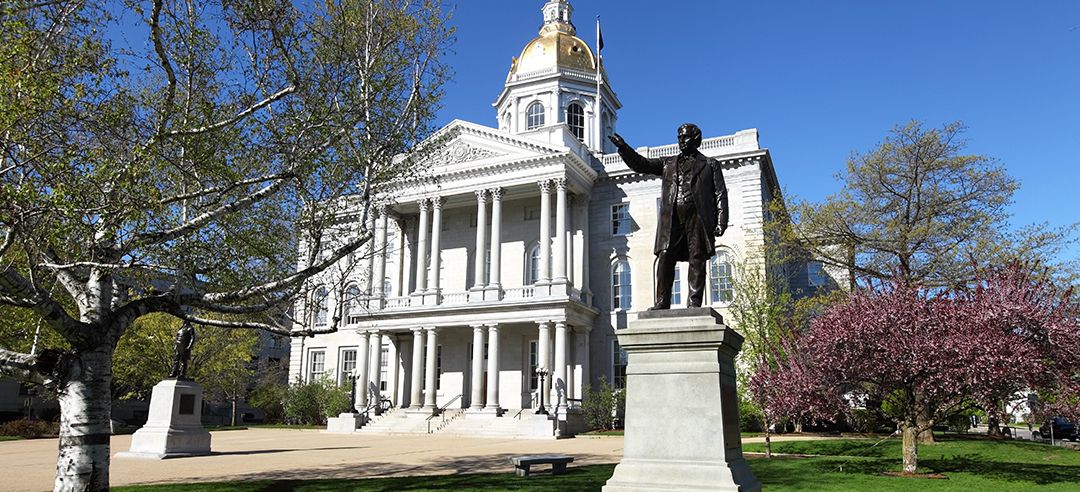Committees of Conference
By BOB QUINN
Chief Executive Officer
The New Hampshire Legislature mostly wrapped up the 2024 legislative session by working out details on several bills important to the real estate industry. House and Senate members meet at the end of the session to negotiate any differences on bills passed by both chambers. These so-called Committees of Conference wrapped up their work last week. Later this week, both the full House and Senate will meet and take a final vote on each of the following bills.
Municipal mandates on parking requirements
House and Senate conferees have agreed on language to House Bill 1400, stating that a municipality cannot, on new residential developments, require more than 1.5 parking spaces per unit for studio and one bedroom units under 1,000 square feet that meet the requirements for workforce housing, and cannot require more than 1.5 residential parking spaces per unit for multi-family developments of 10 units or more.
Both the House and Senate will vote on Thursday to accept or reject the agreement. If the bill does become law, the new statute would go into effect in January 2025.
Municipal authority to expanding housing opportunities
Last month, the NH House of Representative rejected Senate Bill 538, which would have allowed municipalities the option to establish tax relief for the owners of a building currently used for commercial purposes, in whole or in part, if it is converted to residential use.
The tax relief is designed to spur housing growth on already developed land. The program, known as “The Community Revitalization Tax Relief Incentive” (RSA 79-E), has existed for nearly two decades and has proven successful in many communities but is currently limited to four-unit-or-fewer residential conversions.?
The choice to utilize the tax relief is entirely in the hands of each municipality. The Senate reattached the language to House Bill 1400, and the House conferees have now agreed to the language. A final vote will occur this Thursday. If approved and signed by the Governor, the new law will go into effect July 1, 2024.
Faster Driveway Permits
House Bill 1202 came from the work of the House Special Committee on Housing and is intended to shorten the time it takes the NH Department of Transportation (DOT) to approve driveway permits. The House version of the bill gave DOT 30 days to approve existing and residential driveway permits. The Senate amended the House bill to lengthen the time DOT had to process the permit from 30 to 60 days. The Senate version of 60 days was agreed to by the conferees.
Expect the bill to go into effect this fall.
Timeframe for permit exemption extended
Unless otherwise stated, under state law, site plans and subdivisions approved by a municipality are exempt from subsequent changes in zoning ordinances as long as “active and substantial” work begins within two years and construction is completed within five years (RSA 674:39). House Bill 1215 would extend those time frames to give developers five years to achieve “active and substantial” work and 10 years to complete the project. The bill appears headed to a final vote this Thursday.
If signed by the Governor, the new law will go into effect on July 1, 2024.
Appeals of decisions by local building officers
House Bill 1215 also clarifies that the State Building Code Review Board will “hear and decide appeals of orders, decisions, or determinations made by the local building official relative to the application and interpretation of the state building code and state fire code as defined in RSA 155-A:1”
Currently, an applicant appealing a decision of a town’s building officer must first go to the town’s building code review board, which is usually that town’s Zoning Board of Appeals. A local ZBA's members typically do not have expertise in building codes.
The legislation would instead allow the applicant to appeal directly to the State Building Code Review Board, which is made up of experts on codes, to determine if the interpretation by the local building official is correct.
Again, a final vote on the bill will come this week.
Quote of the Week
“Without diversifying housing stock and expanding inventory, a logjam is created. An elderly couple may stay in their longtime residence if no housing specific to seniors is available. ... If they stay in their home, that prevents a young family from possibly moving into home ownership and may force them to continue renting, which then blocks people in emergency shelters from finding an apartment to potentially move into. It's all just stuck.”
–Fair Tide Executive Director Emily Flinkstrom (“Seacoast Residences: $2,100-plus for studio apartment highlights sky-high rental market,” SeacoastOnline, May 29,2024)
For more information, contact New Hampshire Realtors CEO Bob Quinn: bob@nhar.com.

